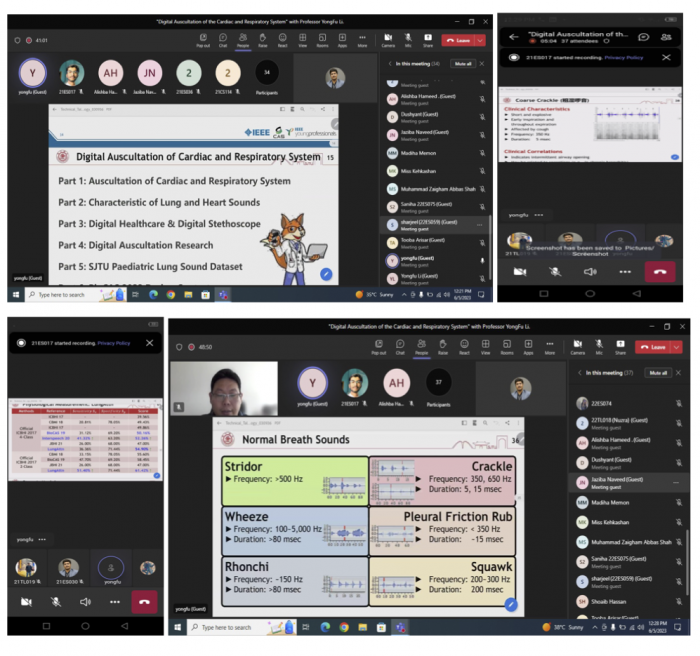- University
- Academics
- Admissions
- Departments
- Institutes
- Directorates
- Innovation & Entrepreneurship Center (IEC)
- Coal Research & Resource Center
- Office of Research, Innovation & Commercialization (ORIC)
- Centre of English Language & Linguistics
- Information & Communication Processing Center
- Management Information Systems
- Planning & Development
- Postgraduate Studies
- Quality Enhancement Cell
- Sports
- Directorate of Finance
- Research
- Sustainability
Report: Session on Digital Auscultation of the Cardiac and Respiratory System
15/08/2023 - 10:37am
INTRODUCTION
On 5th June, 2023, a highly informative session on "Digital Auscultation of the Cardiac and Respiratory System" was conducted by Professor Yongfu Li. The online session was organized by IEEE IMS in collaboration with Electronic Engineering department, MUET Jamshoro. It witnessed the active participation from IEEE as well as non IEEE members. Attendees included professionals, researchers, and students interested in the intersection of technology and healthcare. It aimed to explore the advancements and implications of digital auscultation in the diagnosis and monitoring of cardiac and respiratory conditions.
The session was hosted by Naveed Ali, an active member of IEEE IMS and outstandingly volunteered by IMS team.
KEYNOTE STATEMENTS
During the session, Professor Yongfu Li delivered an engaging presentation, highlighting the key aspects of digital auscultation. The following keynote statements were presented:
REVOLUTIONIZING HEALTHCARE:
Professor Li emphasized how digital auscultation is revolutionizing healthcare by incorporating advanced technology and artificial intelligence to enhance the diagnosis and monitoring of cardiac and respiratory conditions.
ENHANCED ACCURACY AND PRECISION:
The session delved into the use of digital auscultation devices, which leverage sensitive microphones and sophisticated algorithms to capture and analyze heart and lung sounds with superior accuracy and precision compared to traditional stethoscopes.
REAL-TIME MONITORING:
Professor Li discussed the integration of digital auscultation devices with mobile apps or cloud- based platforms, enabling real-time monitoring of patients' cardiac and respiratory health. This capability allows for timely interventions and remote patient management.
OBJECTIVE DATA INTERPRETATION:
The session emphasized how digital auscultation provides healthcare providers with objective data to analyze and interpret cardiac and respiratory sounds. This feature reduces the subjectivity associated with traditional auscultation, enhancing diagnostic accuracy.
EARLY DETECTION OF ABNORMALITIES:
Professor Li highlighted the advanced algorithms employed in digital auscultation devices, which can detect subtle abnormalities in heart and lung sounds. This early detection facilitates timely identification of cardiac and respiratory conditions, such as murmurs, wheezing, or crackles.
REMOTE PATIENT CARE:
The session emphasized how digital auscultation enables remote patient care by allowing healthcare professionals to listen to patients' heart and lung sounds from a distance. This technology expands access to specialized care and reduces the need for in-person visits.
EDUCATIONAL TOOL:
Professor Li presented digital auscultation devices as valuable educational tools. These devices provide visual representations and comparisons of normal and abnormal sounds, enhancing the auscultation skills of healthcare students and professionals.
DATA-DRIVEN HEALTHCARE:
The integration of digital auscultation data into electronic health records (EHRs) and healthcare analytics systems was highlighted during the session. Professor Li emphasized that this integration empowers clinicians to make data-driven decisions, improve patient outcomes, and contribute to evidence-based practice.
COST-EFFECTIVE SOLUTION:
The session discussed the initial investments required for digital auscultation devices. However, it was emphasized that these devices offer long-term cost-effectiveness through improved diagnostic accuracy, reduced referrals, and enhanced efficiency in healthcare delivery.
PATIENT EMPOWERMENT:
Professor Li concluded the session by highlighting how digital auscultation empowers patients to participate in their own healthcare. Patients can listen to and monitor their own heart and lung sounds, fostering greater awareness and involvement in managing their cardiac and respiratory health.
CONCLUSION
The session on "Digital Auscultation of the Cardiac and Respiratory System" led by Professor Yongfu Li provided valuable insights into the advancements and benefits of this innovative technology. Attendees gained a comprehensive understanding of the potential of digital auscultation in improving diagnostic accuracy, enabling remote patient care, and empowering patients to actively participate in their healthcare. It is expected that the knowledge gained from this session will contribute to the adoption and further research of digital auscultation, ultimately leading to improved patient outcomes and enhanced healthcare practices. At last, the Professor also motivated students to open CASS society in their region and told them about its benefits.

- Section:
